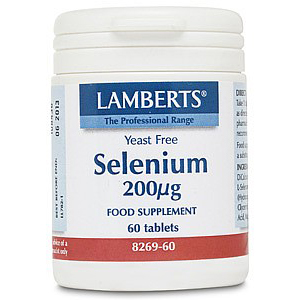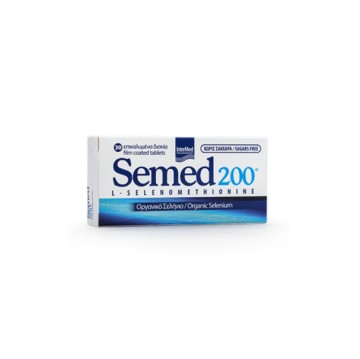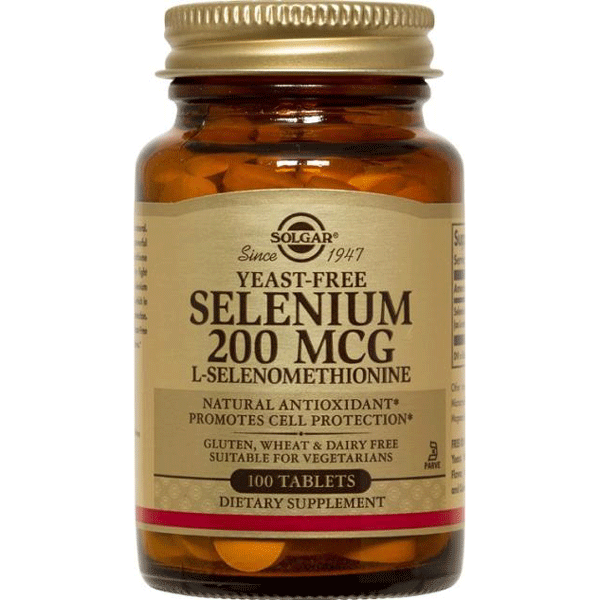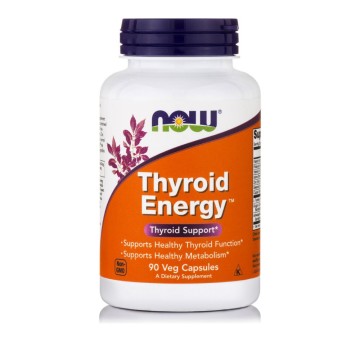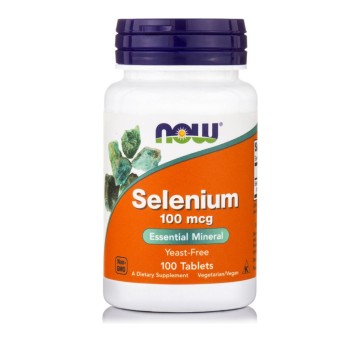What is Hashimoto's?
Η
Hashimoto's disease is an autoimmune disease that occurs in the thyroid gland, an important butterfly-like gland in the neck that helps control many body functions by producing
hormones. When the thyroid is not functioning properly due to this attack, it can cause various problems in the body such as fatigue and weight gain.
This disease occurs more often in middle-aged women, but it can affect anyone. The main treatment is to take drugs that replace the hormones that the thyroid should be producing. Hashimoto's disease is also known by other names such as chronic lymphocytic thyroiditis and chronic autoimmune thyroiditis.
The thyroid is a gland located in the neck, under the area we say "
adam's apple".
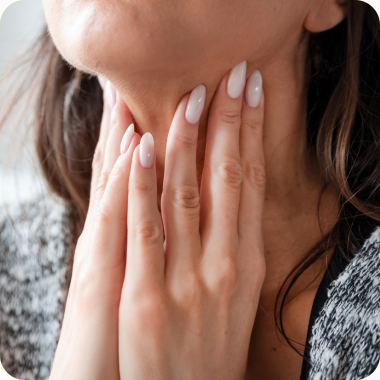
Hashimoto's symptoms
Some people who have Hashimoto's disease may have no symptoms at first. Over time, however, this condition can cause an enlargement of the thyroid, known as a goitre, which means the throat can look swollen, which is usually painless.
If the disease progresses and causes hypothyroidism, then you may start to experience some symptoms over time.
Let's look at some of them in detail
Hashimoto's symptoms:
- Fatigue
- Increased sensitivity to cold
- Swelling of the thyroid (goiter)
- Increased sleepiness
- Mild weight gain
- Dry skin
- Bradycardia (slower heart rate)
- Fragile nails
- Depression
- Constipation
- Muscular weakness
- Hair loss
- Decreased libido (sex drive)
- Pain and stiffness in the joints
- Problems with memory or concentration
- A swollen face
- Irregular or excessive menstrual bleeding
What causes Hashimoto's disease?
Η
Hashimoto's disease is a health problem where your body mistakenly attacks its own thyroid, a small gland in the neck that helps regulate metabolism. Normally, your immune system protects you from disease and infection, but in this case, it mistakenly recognizes your thyroid as something it needs to fight.
This attack by the body causes inflammation and damage to the thyroid, which over time can cause a decrease in thyroid hormone production. These hormones are important for many body functions, including metabolism. When the thyroid does not produce enough hormones, hypothyroidism can occur, a condition that slows the metabolism. However, not all people with Hashimoto's disease experience symptoms of hypothyroidism.
Risk factors
For Hashimoto's disease there are some risk factors which are as follows:
- Sex: Women are more likely to develop Hashimoto's
- Age: Although it can occur at any age, it is usually seen in middle-aged people
- Autoimmune diseases: The presence of other autoimmune diseases, such as rheumatoid arthritis, type 1 diabetes or lupus, may increase the risk
- Family history: If members of your family have thyroid disorders or other autoimmune diseases the risk increases
- Pregnancy: Changes in the immune system during pregnancy may contribute to the onset of the disease
- Excessive intake of iodine: Too much iodine in the diet can cause the disease in predisposed individuals
- Exposure to radiation: People exposed to high levels of radiation are more vulnerable to the disease
Can Hashimoto's be cured?
After doing some blood tests, such as
TSH, the
T3 and
T4, your doctor will tell you which treatment is right for you. This will help balance your thyroid hormones. Also, eat healthy, sleep well and reduce stress to help your immune system and improve your overall health. In very rare cases, if the thyroid has grown too large and is causing problems, surgery may be needed.
Hashimoto's and Nutrition
There is no one diet that cures Hashimoto's disease, but some can help those who have it. These include:
- Gluten or grain free diet: Many people with Hashimoto's do not tolerate gluten well. While there isn't widespread agreement that everyone should avoid it, some find improvement.
- Sugar free diet: Too much sugar can worsen the symptoms of Hashimoto's disease by increasing inflammation and creating other problems.
- Dairy free diet: Dairy can cause problems for some with Hashimoto's, so avoiding it can help.
- Low glycemic index diet: Based on how foods affect blood sugar levels. It helps keep sugar levels balanced and can be helpful for those with Hashimoto's.
These nutritional approaches can help, but it's important to consult a doctor or nutritionist for personal advice.
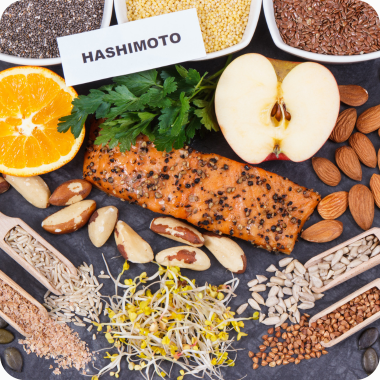
The best foods for Hashimoto's disease
If you have the disease
Hashimoto's, a good diet can help you feel better. Here is a simple list of recommended foods to add to your diet:
- Φρούτα: Prefer berries, pears, apples, peaches, citrus fruits, pineapple, bananas, etc.
- Non-starchy vegetables: Such as courgettes, artichokes, asparagus, carrots, peppers, broccoli, arugula, mushrooms.
- Starchy vegetables: Sweet potatoes, potatoes, peas, acorns, butternut squash.
- Healthy fats: Avocado, avocado oil, coconut oil, olive oil, whole yogurt, etc.
- Animal protein: Salmon, eggs, cod, turkey, shrimp.
- Gluten free seeds: Brown rice, oats, quinoa, brown rice pasta.
- Nuts and butters: Cashews, almonds, macadamia nuts, sunflower seeds, pumpkin seeds, peanut butter, almond butter.
- Legumes: Chickpeas, black beans, lentils.
- Dairy products and substitutes: Coconut milk, coconut yogurt, almond milk, cashew milk, whole yogurt, goat cheese.
- Spices and herbs: Turmeric, basil, rosemary, paprika, saffron, black pepper, tahini, honey, lemon juice.
- Drinks: Water, unsweetened tea, sparkling water.
Some of these foods may not suit everyone. Try different things and see what works best for you.
Foods that are prohibited if you have Hashimoto's
To feel better if you have
hashimoto, it is good to reduce or and to
avoid certain foods. These include:
- Sugar and sweets: Avoid soft drinks, energy drinks, sweets such as cakes, cookies, ice cream, candies, as well as cereals that contain a lot of sugar.
- Fast food and fried foods: Prefer to avoid French fries, hot dogs, fried chicken, etc.
- Processed flours: White pasta, white bread and white flour tortillas are not a good choice.
- Highly processed foods: Avoid frozen meals, margarine, bacon, sausages and salami.
- Gluten: Wheat, barley, rye, crackers and bread should be avoided.
- Fruits with a lot of sugar: Watermelon, mango, pineapple and grapes can raise your blood sugar.
- Dairy & eggs: These foods may be problematic for some.
- Soy: Soy milk, soy sauce, tofu and other soy products may not be suitable.
- Alcohol: Better to limit or avoid alcohol.
By trying to reduce or avoid these foods, you may see improvement in his symptoms
hashimoto and feel better overall.
Can Supplements Help Hashimoto's Disease?
Η
Hashimoto's disease it causes various symptoms, such as fatigue, weight changes, and joint pain. In addition to medication, diet and lifestyle changes may help.
People with
hashimoto they may be deficient in nutrients, which worsens symptoms. A diet rich in nutrients can be good for the thyroid.
Multivitamins or supplements they may help those with specific deficiencies by improving thyroid status and overall quality of life. However, it is important to pay attention to the iodine content of supplements, as excess and lack of iodine can be harmful.
Which vitamins and minerals are best for Hashimoto's disease?
Those with Hashimoto's disease often need extra nutrients, and nutritional supplements may help them feel better. Also, some supplements can reduce inflammation and make the thyroid work better.
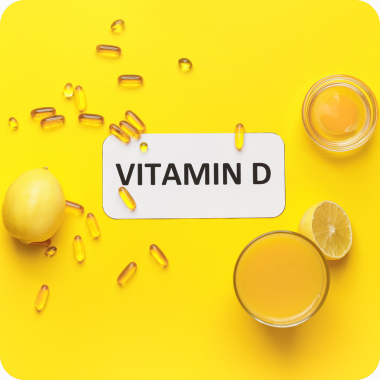
Let's look at a few
supplements which help a lot in this case:
Before you start taking supplements, check with a simple
blood test if you have a real need for them and talk to your doctor about the appropriate dose. It is also good to eat more foods rich in these components, such as vegetables, lean meat, bananas, oily fish and other foods high in vitamins.
Hashimoto complications
The hormones produced by
thyroid gland in the throat are very important for our good health. When someone suffers from
Hashimoto's disease or has low thyroid function (hypothyroidism) and does not receive treatment, may experience various health problems:
- Swollen thyroid (goiter), which can make the throat appear larger and make swallowing or breathing difficult.
- Heart problems, such as poor heart function, enlarged heart, irregular heartbeat and high levels of bad cholesterol.
- Mental problems, such as depression or other disorders, which may worsen over time.
- Sexual and reproductive problems, such as decreased desire, difficulties with orgasm and menstruation in women, and decreased desire or dysfunction in men.
- Problems during pregnancy, such as an increased risk of miscarriage or premature birth. Children born to untreated mothers may have impaired cognitive abilities or other developmental problems.
- Myxedema, a rare and serious condition that involves deep lethargy and can lead to coma. This requires immediate medical attention.
Find on
wecare.gr thyroid and hashimoto related supplements at very low prices
Related products:
Sources: 1. Hashimoto's disease,
2. Thyroid - Hashimoto's disease,
3. Hashimoto's Disease: What It Is, Symptoms & Treatment,
4. Hashimoto's Disease - NIDDK,
5. Hashimoto's Thyroiditis: Symptoms, Causes, and Treatment,
6. HASHIMOTO'S THYROIDITIS DIET: BEST & WORST FOOD LIST,
7. Hashimoto's Diet: Overview, Foods, Supplements, and Tips,
8. What's The Best Multivitamin Or Supplement For Hashimoto's Disease?

















